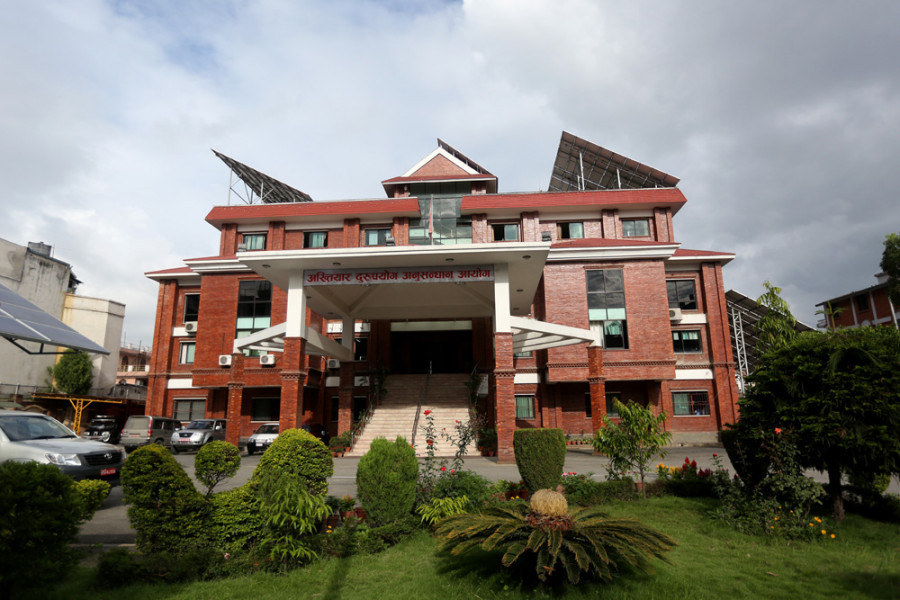National
Corruption in private sector needs probe but so does corruption in political parties, say experts
An amendment to the anti-corruption law seeks to widen the jurisdiction of the CIAA to include the private sector but political parties also need scrutiny.
Tika R Pradhan
An amendment bill that seeks to expand the Commission for Investigation of Abuse of Authority’s jurisdiction to also include the private sector is currently under discussion at the federal parliament. While most anti-corruption experts believe that corruption in the private sector needs scrutiny, political parties too need to come under the commission’s ambit, they say.
The National Assembly’s Legislative Management Committee has started clause-wise discussions on the bill to amend the Prevention of Corruption Act (2002). The amendment bill was registered at the Upper House on January 20 and was sent for discussion to the committee on February 18. Once the National Assembly passes the bill, it will be sent to the House of Representatives for discussion.
Currently, the commission only has the authority to investigate “public institutions”, which have been defined as “government funded or semi-government bodies” by clause 2 (C) of the anti-corruption law. The amendment seeks to include all “institutions registered as per the law” which will bring all registered companies, private institutions, and even non-governmental institutions under its jurisdiction.
The commission itself has long demanded that it be allowed to look into corruption in the private sector and in non-governmental organisations, citing the UN Convention against Corruption to which Nepal is a party.
The convention states: “Each State Party shall take measures, in accordance with the fundamental principles of its domestic law, to prevent corruption involving the private sector, enhance accounting and auditing standards in the private sector and, where appropriate, provide effective, proportionate and dissuasive civil, administrative or criminal penalties for failure to comply with such measures.”
The legally binding convention was endorsed in 2011 by the Jhala Nath Khanal government and all necessary laws should have been drafted within five years.
The current amendment to the corruption law is in line with the UN convention and the new constitution, according to officials at the Prime Minister’s Office who registered the bill.
According to Khimlal Devkota, a senior advocate and former lawmaker, the private sector should be included in the jurisdiction of the anti-graft body not just to comply with the UN convention but also to enhance the capacity of the state’s constitutional bodies.
“The private sector is very vast and this sector has been key in promoting corruption,” said Devkota. “They must be ready to face the anti-graft mechanism if they are clean.”
As many existing regulatory bodies do not have the authority to investigate corruption in the private sector, the CIAA’s jurisdiction must be expanded in line with the UN convention, he said.
The parliamentary committee has been holding discussions with experts over the theoretical aspects of the proposed amendment. These experts include former CIAA chief Surya Nath Upadhyay, current chief Nabin Ghimire, lawmaker Ramesh Lekhak, advocate Devkota, chief of the Nepal Law Commission Madhav Poudel, and chief of Transparency International Nepal Khem Raj Regmi.
Upadhyay, the former commission chief, has a contrary opinion, saying it might not be wise to burden the commission with more responsibility. Even when the commission is just looking into the public sector, there are thousands of cases that are currently pending, he said.
“The anti-graft body, which is unable to investigate the public sector, cannot also look after the private sector,” Upadhyay told the Post. “The CIAA will be unable to focus on its existing works if its scope is widened.”
While many experts seem to agree that corruption in the private sector requires scrutiny, they also believe that the CIAA’s jurisdiction should be widened further to also include the political parties.
The UN Convention explicitly states that the law related to corruption control should include political parties and the public and private sectors, but the amendment bill does not explicitly mention political parties.
“Though the phrase ‘institutions registered as per the law’ includes political parties, it would’ve been better to explicitly mention political parties,” said Lekhak, a Nepali Congress lawmaker and former minister.
Article 7 (3) of the UN convention states that each “State Party shall also consider taking appropriate legislative and administrative measures, consistent with the objectives of this Convention and in accordance with the fundamental principles of its domestic law, to enhance transparency in the funding of candidatures for elected public office and, where applicable, the funding of political parties.”
According to Regmi, on Transparency International’s Global Corruption Barometer, the political sector in Nepal is the most corrupt, followed by the bureaucracy.
Large sums of money are spent every year during the elections and politicians are often involved in quid pro quo deals, said Devkota.
“Political parties float huge amounts of money and corruption is rampant during elections,” he said. “As they’re the ones who run the state mechanism, political parties too need to come under the jurisdiction of the CIAA.”
There are, however, concerns that the CIAA could be used as a political tool to persecute rivals, especially given the notorious tenure of Lokman Singh Karki who used his position as CIAA chief to pursue political vendettas.
If the bill is endorsed in its current, a one-man company, consumer committees, various social organisations, and local clubs could come under the scanner of the CIAA, allowing the commission to play favourites.
“There are high chances that the law could be abused,” said Lekhak, the lawmaker.




 20.12°C Kathmandu
20.12°C Kathmandu














